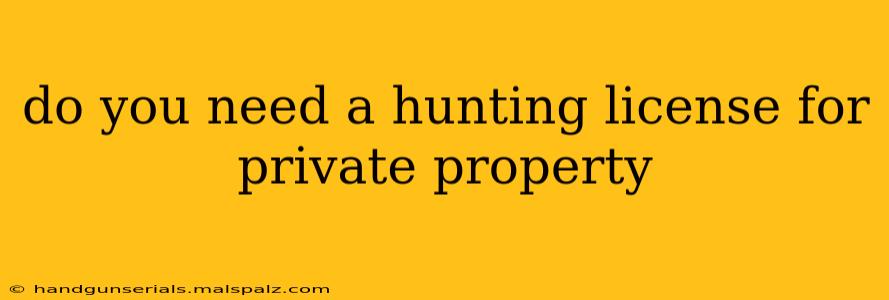The short answer is: it depends. While hunting on private property might seem like a loophole, it's crucial to understand the legal intricacies involved. Simply owning or having permission to be on private land doesn't automatically grant you the right to hunt. Several factors determine whether you need a hunting license, and ignoring these regulations can lead to hefty fines and legal repercussions.
State Laws and Regulations: The Key Determinant
The most important factor is your state's specific hunting regulations. Hunting laws vary significantly from state to state. What's legal in one state might be strictly prohibited in another. These regulations often cover:
- License Requirements: Most states mandate a hunting license, regardless of whether you hunt on public or private land. This license often involves background checks and hunter education courses, demonstrating your knowledge of safe hunting practices and wildlife conservation.
- Landowner Permission: While you might have permission from the landowner, that permission alone isn't always sufficient. Many states still require a valid hunting license even if you're hunting on private property. The landowner's permission simply addresses trespass, not the legal requirements for hunting.
- Species-Specific Regulations: Certain species have additional restrictions, even on private land. You might need a specific tag or permit to hunt certain animals, regardless of location. Bag limits also apply, limiting the number of animals you can harvest.
- Hunting Seasons: Hunting seasons are strictly defined, specifying when and where you can hunt specific animals. Hunting outside these seasons, even on private land, is illegal.
Navigating the Legal Maze: Steps to Take
To ensure you comply with the law, always follow these steps:
- Check Your State's Wildlife Agency Website: This is the primary source for accurate and up-to-date hunting regulations in your state. Look for information specifically addressing hunting on private land.
- Contact Your State's Wildlife Agency Directly: If you have any questions or uncertainties, contacting the agency directly is the best approach. They can clarify any ambiguities and ensure you understand the legal requirements.
- Obtain Necessary Licenses and Permits: Don't assume you don't need a license. Obtain all required licenses, permits, and tags before you go hunting.
- Secure Written Permission from the Landowner: While not a replacement for a hunting license, written permission from the landowner is essential to avoid trespassing charges. Clearly state the dates and species you intend to hunt.
Consequences of Illegal Hunting
Hunting without the required license and permits carries serious consequences, including:
- Significant Fines: Fines can range from hundreds to thousands of dollars, depending on the severity of the violation.
- Confiscation of Weapons and Harvested Game: Your hunting equipment and any animals you've harvested can be confiscated.
- Jail Time: In some cases, especially for repeat offenders or particularly egregious violations, jail time is a possibility.
- Loss of Hunting Privileges: Your hunting licenses may be revoked, preventing you from hunting in the future.
Conclusion: Prevention is Key
Hunting on private land doesn't exempt you from state hunting regulations. Always prioritize responsible hunting practices by understanding and adhering to the laws in your jurisdiction. A few minutes of research and a phone call to your state's wildlife agency can save you significant legal trouble and ensure a safe and ethical hunting experience. Remember, conservation and responsible hunting are critical for maintaining healthy wildlife populations.

